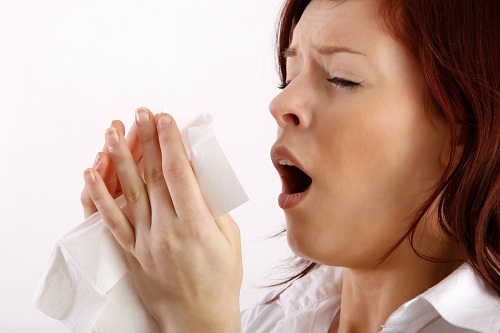 New Health Guide
New Health Guide
A sneeze, the powerful expulsion of air through your nose, is not always bad; in fact, your body uses this to eliminate irritants from your throat or nose. It is an involuntary reaction and you cannot stop it. The things become quite annoying though when you have to deal with sneezing constantly. Even though it's not the result of a serious health issue, excessive sneezingcan still be quite irritating. You usually have to deal with persistent sneezing when you are exposed to an allergen – these allergens could be dust mites, pollen, mold spores, or anything else. You have to identify the source of problem to control excessive sneezing.

Most of the time, the reason behind your continuous sneezing is some type of allergy. This usually happens when you're suffering from allergic rhinitis, which may affect you in specific seasons or hurt you all year round. Sometimes, you may also be allergic to specific foods, such as dairy.
Sneezing fitsare the most common symptom that you have allergic rhinitis. You may experience bouts of sneezing after you wake up in the morning. Other common symptoms include runny nose, nasal congestion, itchy or watery eyes. This could also be due to seasonal rhinitis, which is characterized by frequent attacks of sneezing. If you're a victim of perennial rhinitis, you're more likely to experience symptoms when you inhale specific antigens, such as house dust mite, pet hair, and fungal spores.
Sneezing may well be a symptom of an upper respiratory tract infection. It usually affects people with weakened immune system. You may also be a victim of viral infections, which cause infectious rhinitis – this usually happens due to rhinoviruses and adenoviruses. Your rhinitis may also be due to bacterial infections, but sneezing in this case is usually associated with sinusitis. Fungal infections are rare but possible, and lead to rhinitis and constant sneezing – these infections are more common in people with impaired immune system.
Systemic, airborne, or ingested irritants can lead to you sneezing constantly if you don't do anything to limit your exposure to those irritants. Some of the most common triggers are organic and inorganic dusts, environmental pollution, spicy foods, perfumes, cigarette smoke, dry weather, stress, and hormonal changes.
Using certain medications may also lead to drug-induced rhinitis and cause continuous sneezing. Some of the culprits are non-steroidal anti-inflammatory drugs, nasal decongestants, beta-blockers, antidepressants, sedatives, drugs for erectile dysfunction, and oral contraceptives.
You may also experience sneezing and other allergy related symptoms due to several other causes not mentioned above. This may include the following:
The problem with sneezing is that it usually doesn't come alone – you will also experience issues such as fatigue, lack of concentration, nasal irritation, runny nose, and red eyes. It is therefore important to do something to stop sneezing.
You can find several medications to deal with allergies and infections. You can always start with OTC medications called antihistamines to suppress your symptoms. Zyrtec and Claritin are two common options here. Using allergy shots may be a suitable choice that involves exposing your body to specific allergens in small, manageable doses to ensure your immune system doesn't react to it.
You can try a number of things at home to stop sneezing and control other symptoms. For instance:
You need to understand that it is going to take a few days to clear your symptoms if they are caused by the flu or another infection. To avoid dealing with the hassle caused by constant sneezing, you can take certain steps.
When you're inside, do the following:
When you're outside, do the following: